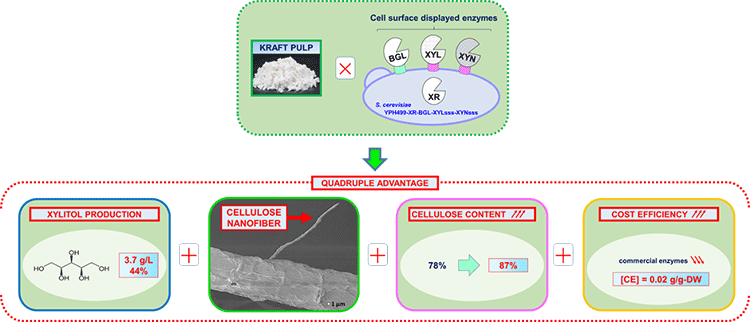Mar 20 2019
The ecological bio-production of cellulose nanofibers and xylitol using altered yeast cells, from material produced by the paper sector has been realized by a team of Japanese researchers. This finding could aid in the development of a greener and more sustainable society. Details of the research were published on March 4th in Green Chemistry.
 The quadruple advantage when using modified yeast. (Image credit: Kobe University)
The quadruple advantage when using modified yeast. (Image credit: Kobe University)
The research was performed by a team led by Assistant Professor Gregory Guirimand-Tanaka, Professor Tomohisa Hasunuma, and Professor Akihiko Kondo from the Graduate School of Science, Technology and Innovation and the Engineering Biology Research Center of Kobe University.
In his attempt to develop advanced processes to realize a sustainable society, Professor Kondo has concentrated on a range of bio-compounds such as xylitol, an extremely valuable commodity chemical, which is extensively used in both the pharmaceutical and food industries (for instance, as a sugar alternate in chewing gum).
Professor Kondo’s group is also fascinated with advanced nanomaterials such as cellulose nanofibers, which present enormous economic potential because of the properties of nanocellulose (mechanical properties, viscosity, film-forming properties etc.), and important applications in food, cosmetic, absorbent, hygiene, medical, and pharmaceutical products.
The international demand for both cellulose nanofibers and xylitol is continually growing, and the cost and environmental impact of their industrial manufacture remain quite high.
The industrial manufacture of xylitol and cellulose nanofibers from purified D-xylose and cellulose fibers, respectively involve expensive and polluting processes. So as to solve these problems and attain a sustainable and environmentally-conscious society, renewable biomass such as paper paste (Kraft pulp) must be used and new unique processes must be formulated.
Biotechnological production of cellulose nanofibers and xylitol using Kraft pulp, deriving from the paper sector, could be a beneficial option, as this material is plentiful, comprises judicious amounts (17%) of D-xylose, and can be transformed into extremely valuable nanomaterials and commodity compounds.
To free the D-xylose from the Kraft pulp, need to add a large amount of commercial enzymes (CE) needs to be added, which is very expensive. Thus, microorganisms such as modified yeast were used, which can produce these enzymes by itself, so as to decrease the amount of CE required to begin with. The altered yeast cells developed are holding these enzymes directly on their own cell surface, and this strategy has been termed as “cell surface display” technology.
In this research, xylitol and cellulose nanofibers were co-manufactured from Kraft pulp by using an altered strain of baker’s yeast (Saccharomyces cerevisiae YPH499 strain) expressing three types of enzymes (xylosidase (XYL), β-D-glucosidase (BGL), and xylanase (XYN)) co-exposed on the cell surface.
By employing this approach, the researchers were not only able to create xylitol and cellulose nanofibers, but also to significantly boost the purity of the cellulose itself and the cost efficiency of the process by decreasing the amount of CE originally required.
Finally, the team was able to fruitfully perform these experiments in bigger volumes by using two-liter jar fermenters, allowing them to further expand bio-refinery industrial manufacture of xylitol and cellulose nanofibers from Kraft pulp.
Based on these results, the team will pursue ways to boost the sustainable bio-production of xylitol and cellulose nanofibers via genetic engineering of yeast cells.